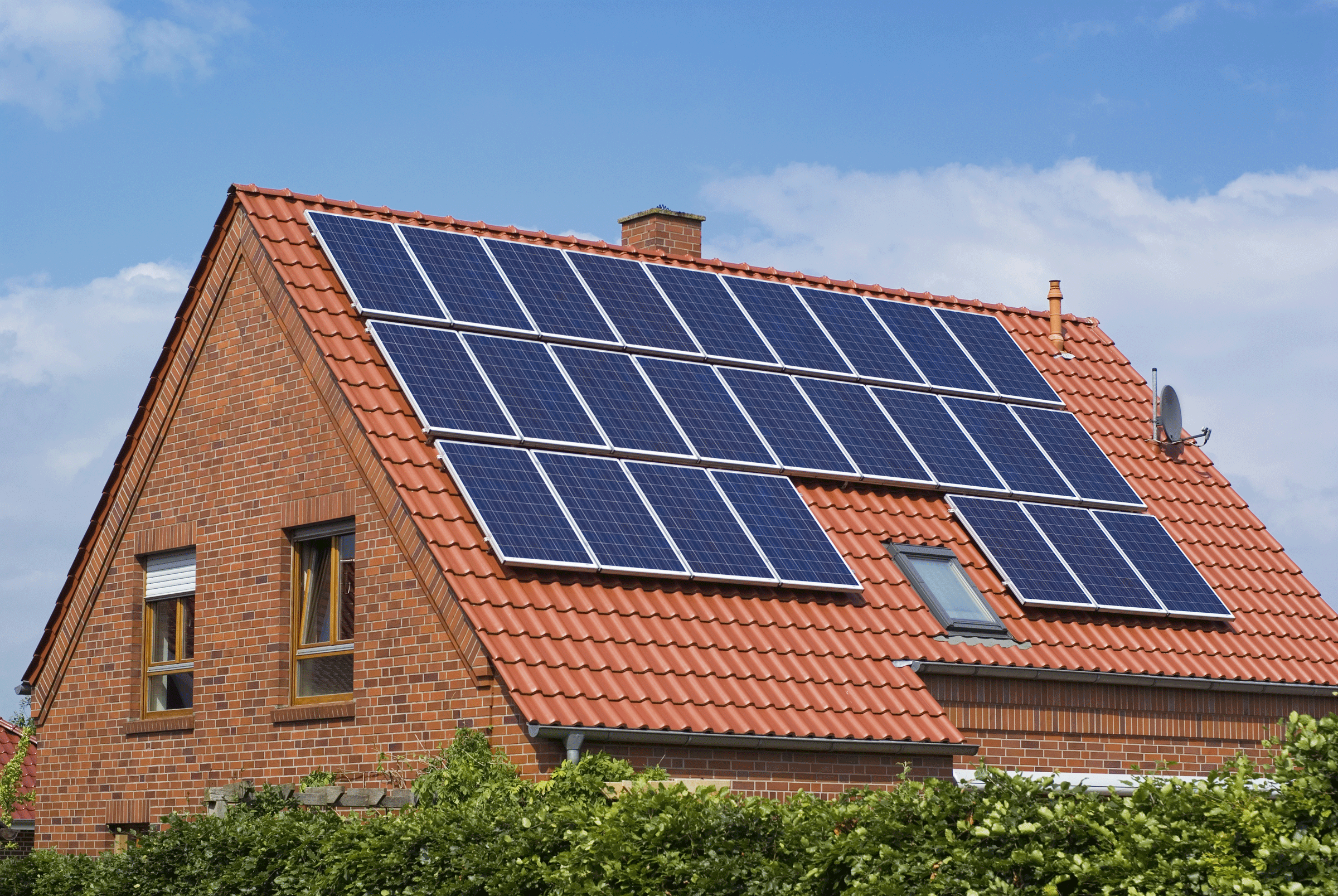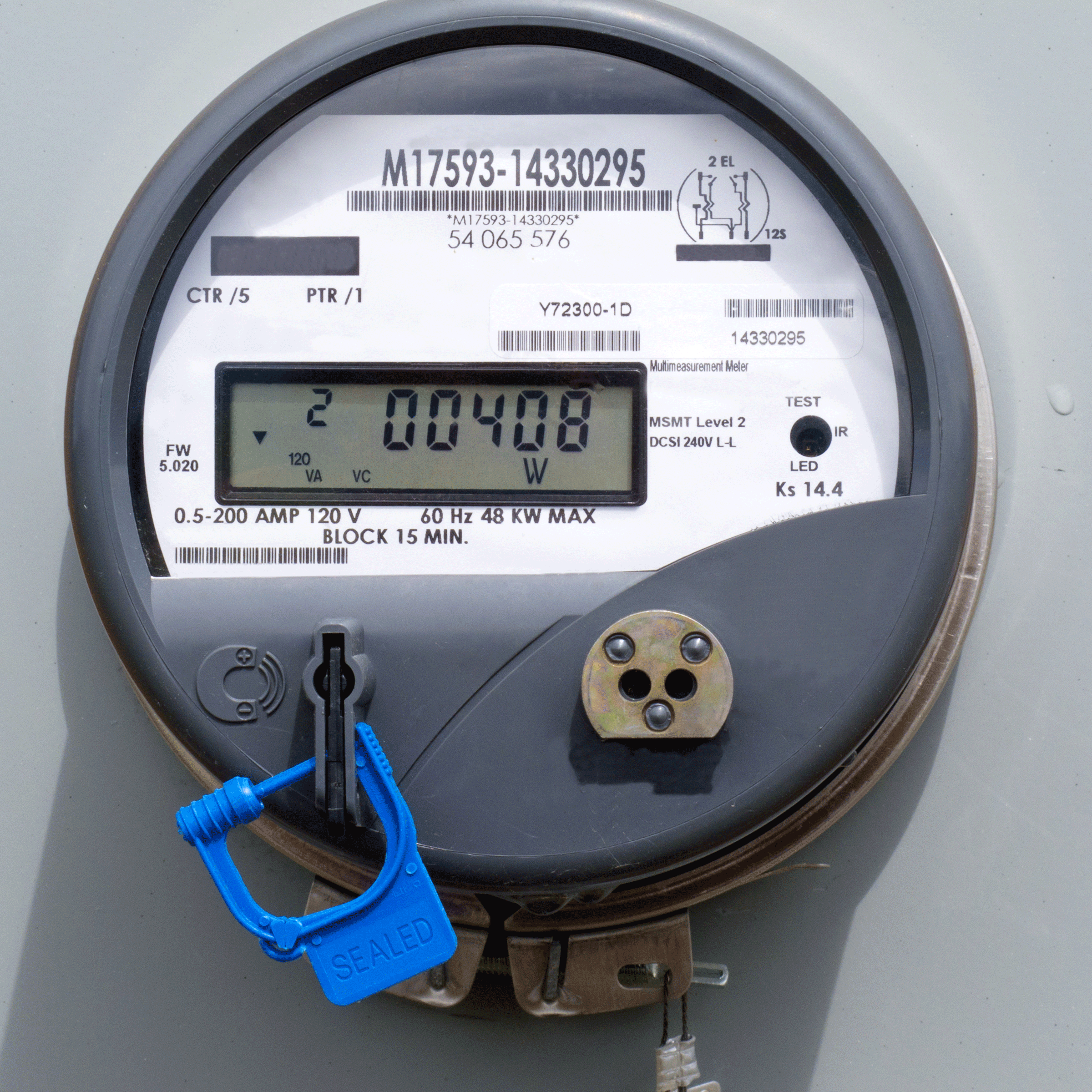Electric Utilities Fight Rooftop Solar

Rooftop solar arrays are a small but fast growing sector of the US energy portfolio. (birgstockphoto.com)
CURWOOD: From PRI and the Jennifer and Ted Stanley Studios in Boston, this is Living on Earth. I’m Steve Curwood. The electric grid provides power to everyone who’s connected, and homeowners with rooftop solar can also give some power back to the grid. So when the solar panels are generating more electricity than a grid-connected house can use at that moment, net metering kicks in. The billing meter spins backwards, and homeowners get credit for what they produce. Of course, when the sun isn’t shining or household electric demand is high, the meter spins forward to show what’s owed to the power company. So net metering is a key economic incentive for individuals to invest in solar, along with rebates and tax credits. But Bryan Miller of the Alliance for Solar Choice says utility companies don’t like net metering and are now fighting back.
MILLER: Net Metering is the core policy for rooftop solar in the entire country. It is the most important policy. It ensures that people are properly credited for the power that their solar systems produce.
CURWOOD: So what are the reactions that you see when it comes to net metering?
MILLER: The utility companies don’t like solar, period. And net metering is their preferred way lately of trying to stop solar. There’s no better example of this than the piece of legislation that just died in Washington State, where utilities literally tried to write a law that said they were the only ones legally able to provide solar in the state. So that’s just a very clear example of what the fight’s about. It's about utilities trying to stop competition and rooftop solar is the first form of true competition that they have ever faced.
CURWOOD: Now, the utilities would say, look, if we are providing wires to these devices, we ought to make some money on it...they’re costing us money. What do you say to those arguments?
MILLER: Well, they do make money. Rooftop solar customers continue to pay for power when they buy it, but the utilities’ position seems to be that people should buy power whether they need it or not. Let me just give you an analogy. A lot of homeowners these days are switching to natural gas appliances and natural gas heating because of the low price of natural gas. We don’t hear utilities complaining about that at all, and that’s far more disruptive in terms of the amount of power that’s migrating to a different source right now. Of course, the reason utilities aren’t complaining about that at all is they own the natural gas as well. Their problem with solar is that they don’t own it. They don't own the sun. So that’s what this fight is about and policymakers are going to recognize that the utilities have changes that they have to accommodate all the time, but that’s not an excuse to stop competition.
CURWOOD: Well, tell me about a couple of specific battles that you’re seeing across the country. What’s going on in the northeastern part of the United States about Canadian hydropower?
MILLER: Well, I think what’s going on in the northeastern United States is the utilities are trying to build billions of dollars of transmission through environmentally sensitive lands to import, in this case, foreign hydropower from Canada. And the utilities want to do that because if they get to build those billions of dollars of transmission lines, they’ll make more money. So at the same time they’re trying to build that transmission line, they’re launching an attack against rooftop solar and net metering specifically because they know that rooftop solar helps avoid the cost and undermines the argument for those expensive transmission lines.
CURWOOD: Now, this debate has a life of its own in sunny Arizona. What’s going on there?
MILLER: Arizona’s a very strange story. It has been revealed that the largest utility in the state, APS, or Arizona Public Service, has actually been lobbying to increase property taxes on rooftop solar customers. A senior member of the Republican leadership in the legislature has confirmed that as well as the governor’s office. APS continues to deny that despite the fact that there’s these highly placed Republican officials who are saying that APS has lobbied them for a tax increase on rooftop solar.
CURWOOD: There have even been some presidential campaign-like attack ads airing in Arizona. Let’s have a listen to this one put out by the utility.
[MUSIC AND VOICES FROM AD]
WOMAN: We’ve seen this before.
OBAMA: The true engine of economic growth will always been companies like Solyndra.
WOMAN: Connected companies getting corporate welfare. Now, California’s new Solyndras, Sunrun and SolarCity are getting rich on hardworking Arizonans. Out-of-state billionaires using your hard-earned dollars to subsidize their wealthy customers. It’s not right. We don’t need this California-style corporate welfare in Arizona.
MILLER: Not a word of that ad is true, and the utilities at first actually denied that they funded that ad and many others like it. And after months of denials, eventually were caught funneling money through what we call “dark money organizations” that don’t disclose the source of their donations.

Net metering is the system by which utilities keep track of how much energy is produced by an individual rooftop solar array. It’s crucial to the economic viability of residential solar production. (bigstockphoto.com)
CURWOOD: I suppose anyone opposing solar power would want to use dark money.
MILLER: [LAUGHS] They certainly don’t want to do it in the sunlight. That’s definitely true.
CURWOOD: As solar companies fight back, you have an unexpected advocate. Barry Goldwater, Jr. is on this particular ad I want you to listen to now.
GOLDWATER: Conservatives want no, they demand, freedom of choice, whether it’s healthcare, education, or even energy. We can’t let solar energy be driven aside by monopolies who want to limit that choice. It’s not the American way. It’s not the conservative way.
MILLER: The reason conservatives support solar so much is because it’s competition, and the idea that conservatives should be told that they have to purchase power from a regulated monopoly and not have the option for competition is exceptionally offensive to conservatives. And so that’s why we see rooftop solar just polling far higher in popular support than any other form of energy.
CURWOOD: How large is the percentage of the American electric supply that’s solar at this point?
MILLER: It’s small. It’s less than one percent. And so when utilities launch these really over-the-top attacks like the ones that you have played, it is a very strange situation for them to try to explain why they can’t even tolerate a small amount of competition. It’s small, but on the other hand, it’s growing. It grew about 60 percent last year. The rate of employment growth in the rooftop solar industry was ten times the national average last year. We expect that number to grow rapidly over the coming decade.
CURWOOD: Bryan Miller, come on, you work for a major solar installation company. Obviously you really like this stuff.
MILLER: I do. I actually used to work for the largest utility in the country as well, and I’m certainly proud to be on this side of these issues. There’s no question that people of good faith on both sides have legitimate disagreements, but we should have an open and honest fair conversation. Reasonable people on both sides can agree to disagree on some things, but the utilities should stop the political attacks.
CURWOOD: Bryan Miller is Vice President for Public Policy and Power Markets for Sunrun, a solar solutions company headquartered in San Francisco. Bryan, thanks so much for taking the time with us today.
MILLER: You're welcome. Thank you for having me.